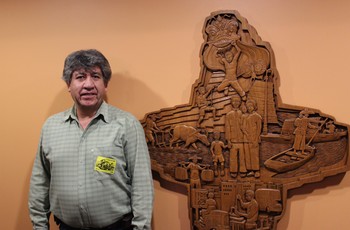Eleven international peacemakers from around the world are visiting congregations, presbyteries and colleges of the Presbyterian Church (U.S.A.) from Sept. 27-Oct. 21.
They are sharing their stories about church-based ministries in their countries that seek peace justice and pursue peace in the name of Jesus Christ. This year’s international peacemakers come from Bolivia, Colombia, Iran, Iraq, Israel/Palestine, Jamaica, Madagascar, Niger, Northern Ireland, South Sudan and Syria.
The International Peacemaker program is sponsored by the Presbyterian Peacemaking Program.
Wilhelm Piérola Iturralde, a Bolivian engineer, has used his expertise since 1986 to improve the lives of families working in the country’s mining industry. He is currently serving his second term as president of the Bolivian Joining Hands Network (UMAVIDA) ― a partnership ministry with the Presbyterian Hunger Program ― which organizes citizens to advocate on issues related to mining, water rights and environmental justice.
Iturralde has devoted his life to community solidarity and organizing to work for human dignity and environmental justice. He will be speaking to Presbyterians in the presbyteries of North Alabama, Cascades, Heartland and San Francisco.
What is the situation in your country that you will be addressing?
Our central theme is to address the impact of mining on human life and all of creation.
How are the faith communities addressing this situation?
We are engaged in accompaniment ― of our people and of civil society. We don’t just accompany, we organize communities so they have trust in each other and in their ability to help and protect themselves. UMAVIDA is a coalition of churches ― Lutheran, Methodist, Presbyterian ― and other grassroots organizations.
What lessons from your situation are you trying to communicate to U.S. Presbyterians?
I want to stress the importance of solidarity, which is the central axis of our work. Around this you can generate discussion and cooperation. These are common factors between the South and North. The issue of poverty is universal ― it just presents itself in different ways. It is necessary that the South and North work together. We won’t be able to survive without working together.
What is the primary message you want to communicate to U.S. Presbyterians?
Together we need to struggle and fight for life. We must ally the church and civil society to protect life and all creation.

